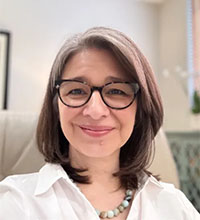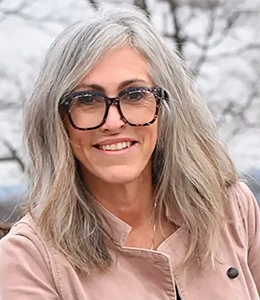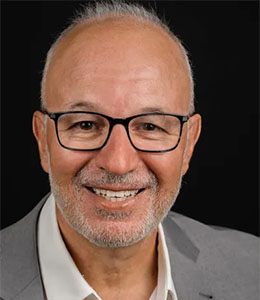Five Fridays 2025-2026
Our 2025-2026 Five Friday topics and presenters are listed below. Please note that for 2025-2026, four of the Five Friday seminars will be in person, at the BCC Service Center in Bethesda, MD. Our virtual webinar will be held via zoom, with zoom links sent to all registrants on the Monday before the seminar.
Borderline: The Biography of a Personality Disorder
WSPP 2-part with Alexander Kriss, PhD – Clinical Follow-Up
Limited to 15 (4 spots are open). Earns 9 CEs.
Friday, September 19th, 9:30am – 4:00pm (to allow lunch break), and
Saturday, September 20, 9:30am – 12:30pm
In person at the BCC Service Center
This was Dr. Kriss’s original seminar from January 10, 2025: https://wspp-dc.org/five-fridays-2024-2025#borderline. This September session will be a small group, clinical follow up. Updated learning objectives will be added soon and sent to all registrants.
This workshop will unpack BPD by placing it in its historical context and exploring how that history reflects the lived experience of individuals called borderline today. We will consider how borderline conditions can be successfully treated from a psychoanalytic perspective by borrowing pluralistically from contemporary approaches, and consider what these approaches offer that are missing from dominant cognitive-behavioral paradigms aimed at treating BPD.
Learning Objectives:
- Identify 4 historical perspectives on BPD that inform current psychoanalytic treatment approaches.
- Describe the etiology of borderline phenomena and identify at least 2 specific sequelae of developmental arrest
- Identify 3-4 core features of BPD as they manifest in clinical contexts
- Identify key differences in conceptualizing a BPD diagnosis using psychodynamic diagnostic criteria versus those found in the DSM
- Identify key differential diagnosis concepts between BPD and other disorders, especially NPD
- Describe contemporary perspectives on discussing BPD diagnoses with clients
- Identify 3 phases of psychoanalytic treatment of BPD and key features of each
- Identify central clinical techniques in the psychoanalytic treatment of BPD, including the use of countertransference and boundary-setting
Presenter Bio:

Alexander Kriss, Ph.D., is an associate professor of psychology at Fordham University in New York City and director of the Fordham Community Mental Health Clinic. His writing has appeared in Psyche, Salon, and Logic, and academic journals such as Psychoanalytic Psychology, The American Journal of Psychoanalysis, and Attachment. Dr. Kriss is the author of two books, Borderline: The Biography of a Personality Disorder and The Gaming Mind: A New Psychology of Videogames and the Power of Play. His private psychotherapy practice is based in Sleepy Hollow, NY.
“We all need somebody to Lean On”: Psychotherapists Responsibilities and the Role of the Practice Executor
October 10th, 2025, 10:00am – 1:00pm
Robyn B. Miller, PhD
This seminar earns 3 CEs in Ethics.
This practical workshop explains clinical, business, and emotional considerations in drafting a Professional Will and naming a Practice Executor. The ethical duties of psychotherapists to plan for patient continuity of care and security of medical records, in case of incapacitation or death, are outlined. Therapist avoidance and denial often interfere with fulfilling this ethical mandate, and the impact on patients of both conscientious and negligent planning are explored. Described through a lens of lived experience, actionable strategies are presented to help therapists prevent traumatic loss, ensure ethical compliance, and reduce the burden of an abrupt practice closure on colleagues and loved ones.
Learning Objectives:
Attendees will be able to:
- Explain the psychotherapist’s ethical duty to plan for sudden terminations.
- Be aware of the important components to include in a plan / Professional Will
- List the clinical, business, and practical duties of a Practice Executor, and guidelines for best practice.
Presenter Bio:

Robyn Miller, Ph.D. is a clinical psychologist practicing in Maryland since 2002, and she is the founder of TheraClosure, LLC, the first psychotherapist professional executor service. Dr. Miller trained at the Massachusetts Mental Health Center/Harvard Medical School and at Harvard University Counseling Center. She earned a Ph.D. from University of Rochester, and a B.A. from Tufts University. Psychotherapy interests include menopause transitions, eating and mood disorders, and trauma. Dr. Miller writes and trains clinicians on professional wills and the role of practice executor.
Dr Miller has stated that she does have a conflict of interest as she is involved in a business which provides therapist professional executor services.
Healing the Wounds of Development: Attachment-Based Experiential & Relational Psychotherapy (AERP)
November 14, 2025, 10:00am – 1:00pm
Eric Spiegel, PhD
We will present an integrative attachment-based therapy that combines experiential and relational approaches. Dr. Spiegel will teach about the role that experiential techniques (e.g. hypnosis, mindfulness, somatic experiencing) can play in a relationally attuned therapeutic relationship towards facilitating attachment repair in patients with developmental arrests (e.g. affect dysregulation, lack of identity formation, boundary difficulties, etc.). The relational and psychological functions of attunement, representation, and mentalization are essential components of a secure attachment experience. The presenter will review the literature and describe how experiential and relational principles can be applied in working with each of these areas of attachment. In its’ utilization of shared attention, tone of voice, pacing, language, and imagery, clinical hypnosis as a state, relationship, and technique offers psychotherapists a way of introducing a healthy attachment experience and renewing appropriate developmental functioning in these patients. Participants will develop increased competency in understanding how the therapeutic relationship in general, and experiential techniques from an attachment frame in particular, can be utilized to re-build developmental structure and re-engage reflective functioning.
Learning Objectives:
- Define mentalization and explain how it develops during a healthy attachment process
- Differentiate between contingent and marked mirroring
- Conceptualize the use of hypnosis from a relational therapeutic perspective
- Match each of the 3 phases (attunement, representation, mentalization) of the ARM integrative experiential-relational therapeutic model
- Articulate how the elements of attunement, representation, mentalization can be used to facilitate developmental repair in an integrative experiential-relational therapeutic model.
Presenter Bio:

Eric Spiegel, Ph.D., is a licensed psychologist in private practice in Bethesda, MD and Philadelphia, PA. Dr. Spiegel is a Fellow and Past-President of the American Society of Clinical Hypnosis (ASCH). Additionally, he is co-author of the book Attachment in Group Psychotherapy, published by the American Psychological Association in 2013. Dr. Spiegel has also published on attachment and hypnosis in the International Journal of Clinical and Experimental Hypnosis (IJCEH) and American Journal of Clinical Hypnosis (AJCH). He specializes in working with anxiety, trauma, and relationship issues.
Unbearable Aspects of Analytic Work in These Times
January 23, 2026, 11:30am – 2:30pm via Zoom
Anton Hart, PhD
Psychoanalysis is not just an “impossible profession”, it’s an unbearable one, especially at times like these when the world feels like it is falling apart. Our traditional emphasis on free, open speech as opposed to acting can seem more impotent than wise these days.
The psychoanalytic psychotherapist is subject to the world’s happenings the same as the analysand. Yet the analysand comes to analysis for a kind of relief from the feeling that life, or some things about it, are unbearable. Is the taking of the patient into our care an implicit communication that the we have the ability to bear those things which the patient is not yet able to bear? Are we hesitant about laying bare those aspects of our experience that are most unbearable? Should we be? We will explore the interrelated concepts of the “unbearable” and the “un-bare-able” in the psychoanalytic situation.
Bridging the Gap Between “Knowing” and “Doing”: the Detective Work of the Unconscious
March 13, 2026, 10:00am – 1:00pm
Julie Lopez, PhD
In this fast-paced, experiential training, Dr. Julie Lopez will guide you in using the templates of your own experiences to decode what is alive in the unconscious. Together, you’ll explore how the body, emotions, and even patterns of avoidance can serve as guideposts to hidden opportunities for growth, both personally and in your work with clients.
You’ll identify the role of implicit memory in client symptoms, understand its impact on transference and countertransference, and learn to use avoidance and addiction as vehicles for transformation. You’ll also gain practical strategies for incorporating non-talk-based methods into your practice, supporting deeper, lasting outcomes.
Learning Objectives:
- Identify implicit memory patterns in client presentations and symptoms
- Manage transference and countertransference responses triggered by implicit memory
- Utilize avoidance and addiction behaviors to design implicit memory interventions
- Implement non-talk-based methods in treatment protocols
Presenter Bio:

Dr. Julie Lopez is a trauma expert and Emmy-winning addictions specialist with over 30 years of clinical experience working with trauma, PTSD, and compulsive behaviors. She is the founder of The Viva Center, a mental health practice specializing in brain and body-based therapies servicing the DMV area, and the author of Live Empowered!, endorsed by Dr. Gabor Maté as “an accessible guide” to implicit memory and personal transformation.
She served as adjunct faculty for almost a decade in The Catholic University of America’s graduate social work program, training clinicians in trauma-informed practice and innovative treatment approaches. She also designed the Trauma-Informed Clinical Practice certification program that she hosted for over a decade.
Dr. Lopez’s expertise has been featured by The Associated Press, Telemundo, Fox News, and numerous podcasts and media outlets, and she is a regular presenter at the world-renowned Rancho La Puerta Wellness Resort.
From Protest to Reassurance: Transforming Dynamically Motivated Conflicts to Intimacy and Security in the Couple
April 24, 2026, 9:30am – 12:30pm
Michael Wannon, PhD
Dr. Wannon will present a psychodynamic model that will help the couple therapist conceptualize and treat the repetitive conflicts presented by the couple. The model will incorporate concepts from personality development, Object Relations and Self-Psychology. Techniques such as Empathic Dialogue, Languaging the Couple’s Collusion, and Facilitating Deep Affective Immersion between the couple, will be explained as ways to move the couple from repetitive and destructive conflicts to deeper and more secure intimacy. Essential to this process is the ability of the couple therapist to conceptualize the Transference Protests present in the couple, and to allow the conscious exploration and grieving of these themes, thus allowing for the intimacy and connection the couple craves. Dr. Wannon will present several clinical examples of couples representing a diversity of racial, cultural and sexual orientations to demonstrate how the clinician can use the mode with couples.
Learning Objectives:
- Conceptualize the psychodynamic understanding of conflict as Protest in the pursuit of personality growth.
- Explain how repetitive conflicts can be conceptualized as “Protest, in the pursuit of Personality Growth.”
- Identify therapeutic techniques that can transform these repetitive conflicts and discord, into intimacy and security between the members of the couple
Presenter Bio:

Dr. Wannon is the Chair of ICP+P’s Couples Training Program. He is also a faculty member in the institute’s Psychotherapy Program, and previously served as that program’s co-chair. He has presented at both national and international conferences on Couple treatment, and the integration of Object Relations and Self Psychology in therapeutic technique. In 2023, he was awarded the Distinguished Practitioner Award, by the American Psychological Association’s Society for the Advancement of Psychotherapy. Dr. Wannon is in private practice in Chevy Chase, Maryland. In additional to his clinical practice, he also runs several supervision groups for clinicians.
